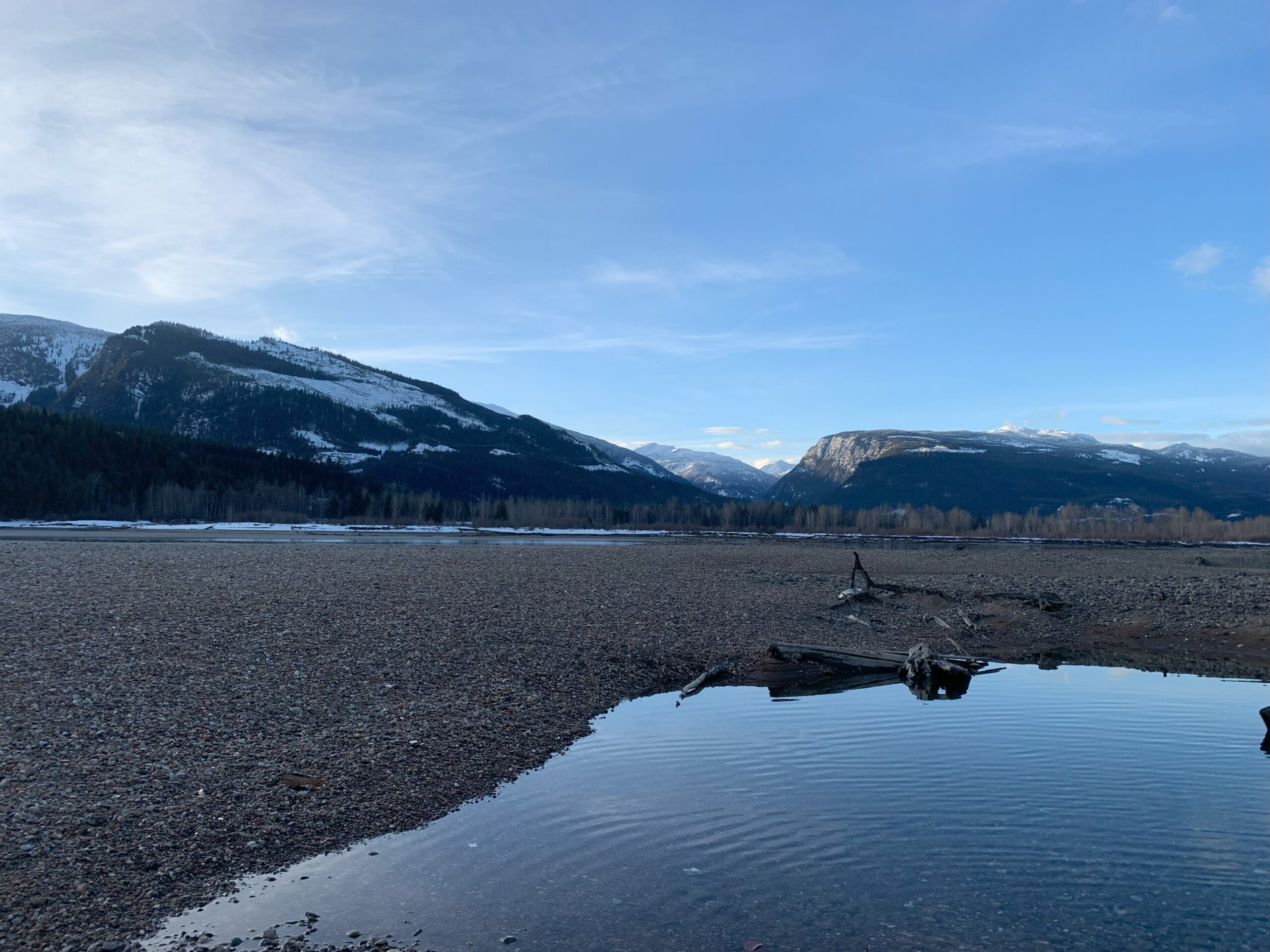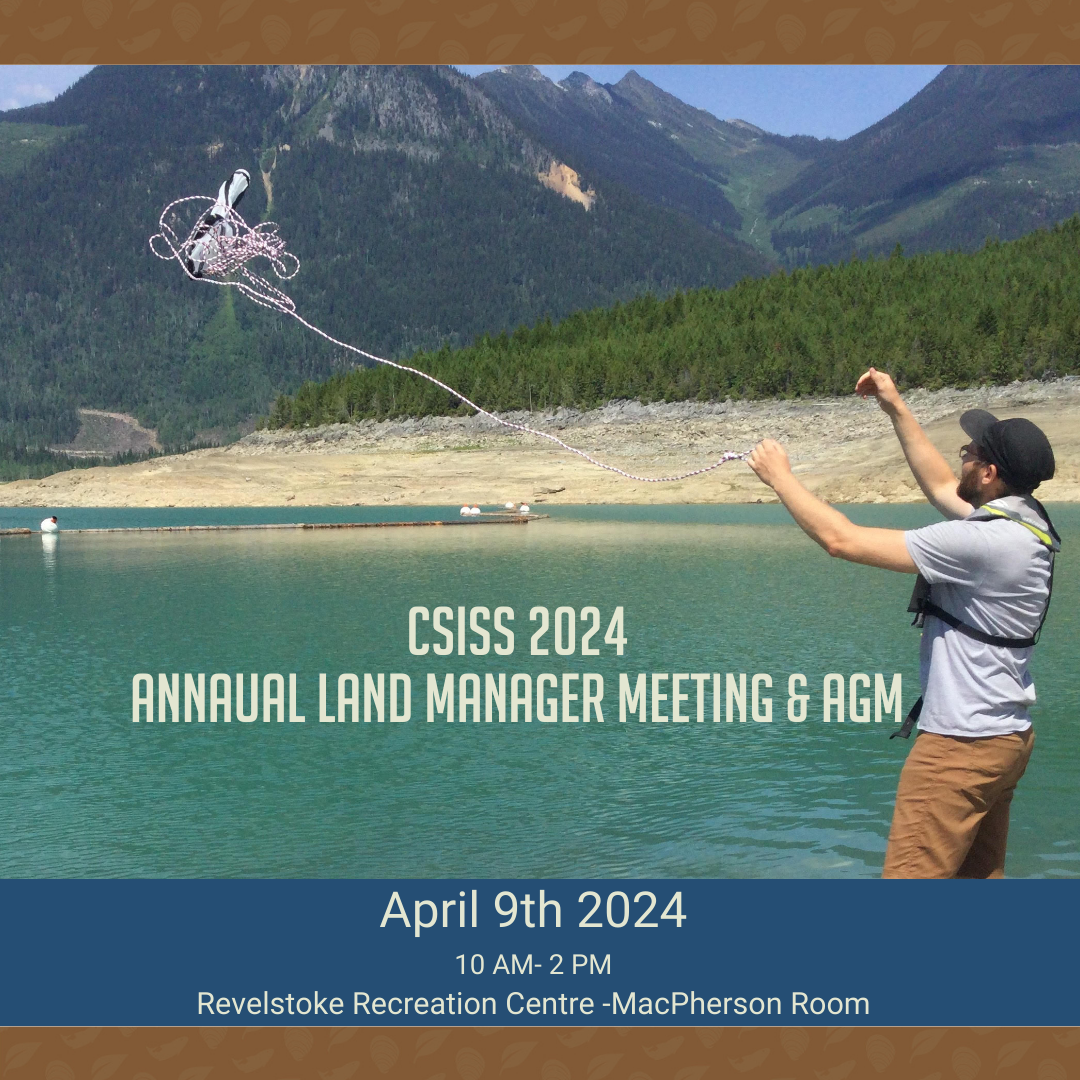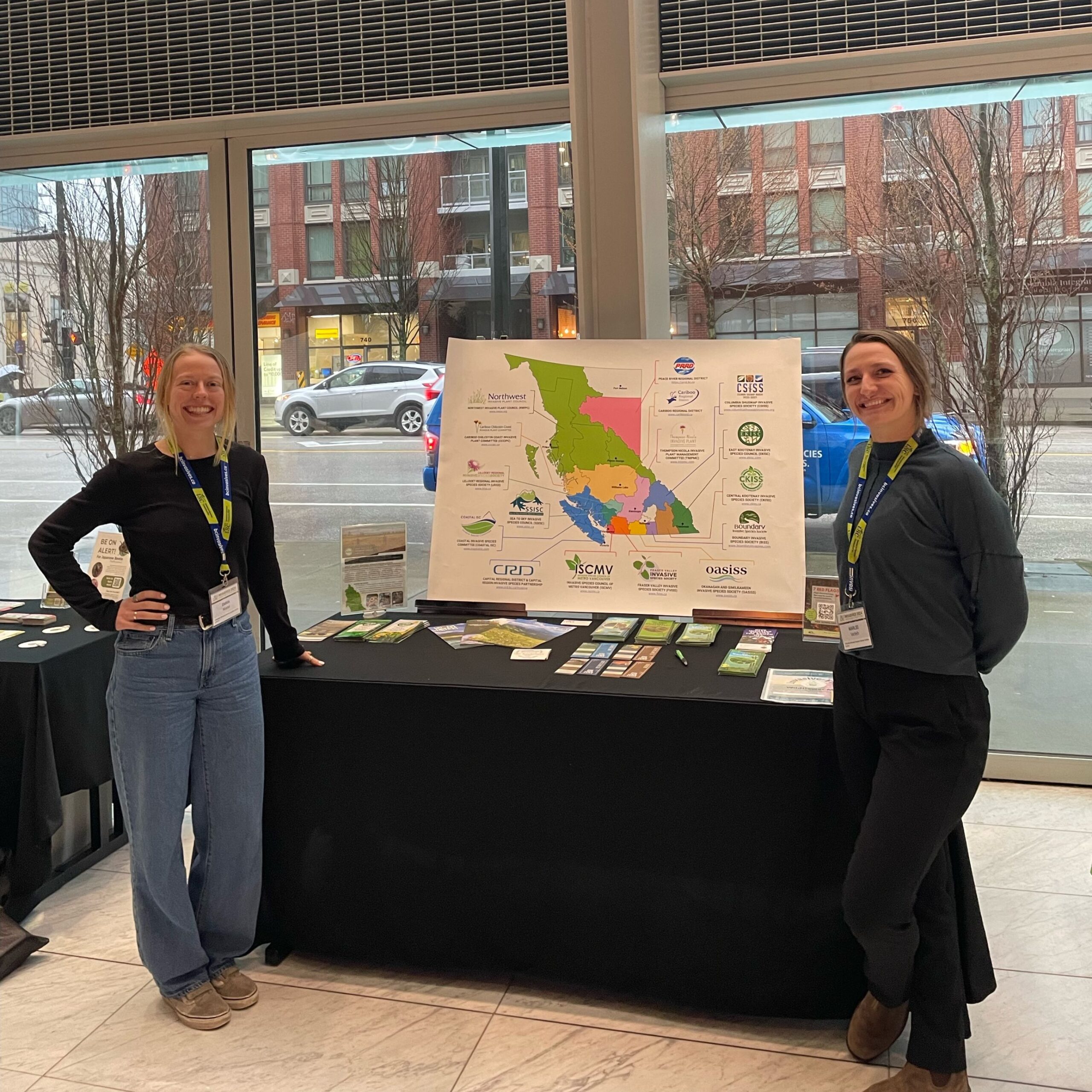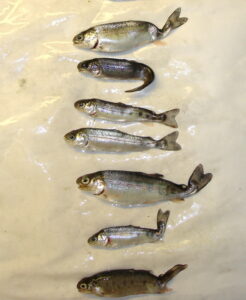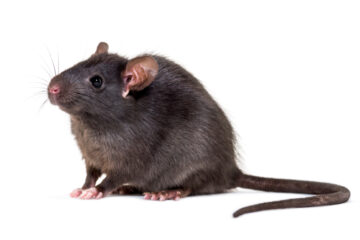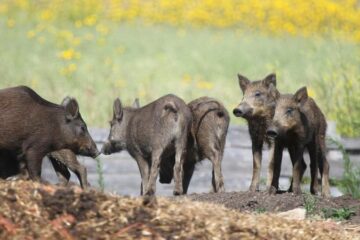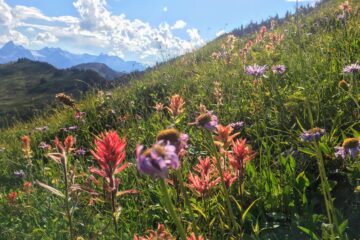CSISS Updates
| Land Manager Meeting and AGM | ISCBC Annual Forum | Squeal on Pigs | Fish Webinars | Captivating Content | Upcoming Events |
Spring Greetings from CSISS
As the snow quickly melts away and the sun graces us with warmth, we find ourselves immersed in the joyful tasks of planting seeds, both literally in our gardens and metaphorically as we prepare for the exciting year ahead. Our Field and Outreach teams are hard at work, diligently planning aquatic sampling, terrestrial inventory and treatment projects, and organizing our events schedule for the upcoming months. Things are going to be busy around here!
In 2024, we have a fantastic team and are excited to get out in the field. We are looking forward to connecting with our partners and communities. See you soon!
In the meantime have a peak at what is brewing at CSISS!
CSISS Land Manager Meeting and AGM
Date: April 9th 2024
Location: Revelstoke Community Centre MacPherson Room, 600 Campbell Rd, Revelstoke
Land Manager Meeting: 10:00 am- 12:00 pm
Join CSISS in completing the annual review of the Columbia Shuswap priority invasive species lists and watchlists from the 2020-2025 Columbia Shuswap Operational Plan.
We invite all land managers and partners to provide input on regional invasive plant and animal priority lists.
Annual General Meeting: 12:30 pm- 1:30 pm
The meeting will include CSISS program updates, financial updates, and 2019-2024 Strategic Plan review.
Board meeting: 1:30 pm- 2:00 pm
Please be in touch if you have any updates or questions you‘d like to share at our AGM on invasive species work in the Columbia Shuswap region, or if you‘re interested in joining our Board of Directors.
Registration Link: https://forms.gle/mH3j7P72rEfrV7GB8
Invasive Fish Webinars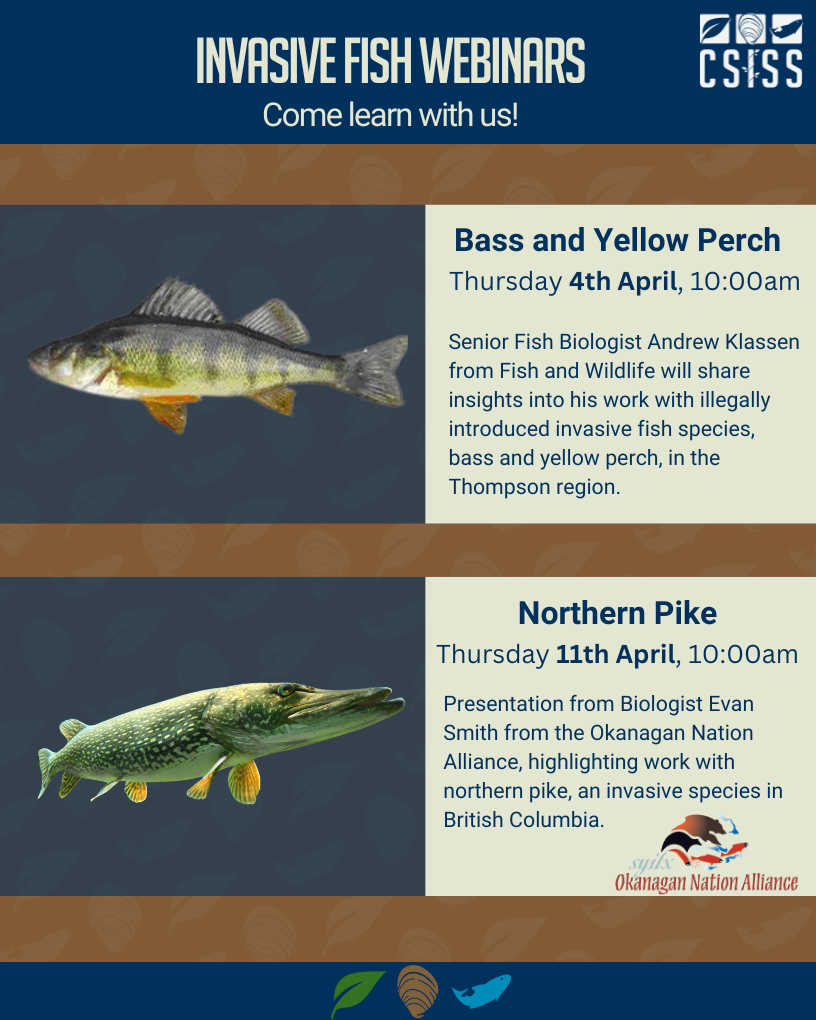
Get in the know about Aquatic Invasive Species
CSISS will facilitate two spring webinars with local fish experts and learn about their important work
Are you curious about aquatic ecosystems or a keen angler? If so, we have just the webinars for you!
Invasive Fish – Webinar One: Bass and Yellow Perch
Thursday 4th April, 10.00am
Andrew Klassen brings over 16 years of invaluable experience as a Senior Fisheries Biologist for the Fish and Wildlife Branch in the Thompson Region. Throughout his career, Andrew has been engaged in the conservation and management of aquatic ecosystems, specializing in invasive fish and small lake management. He pursued post-secondary education at both BCIT and Thompson Rivers University.
As a fisheries biologist with the Provincial Government, Andrew’s work has focused on implementing effective strategies for preserving native species and combating the proliferation of illegally introduced invasive fish species such as bass and yellow perch. During the webinar, Andrew will provide insights into the background of the regional fisheries program, and the native species they manage while emphasizing the importance of managing invasive species.
Zoom Link Registration, here
Invasive Fish- Webinar Two: Northern Pike
Thursday 11th April, 10.00am
Evan Smith is a Biologist representing the Okanagan Nation Alliance, where he serves as a key figure in the battle against invasive species threatening British Columbia’s delicate ecosystems. Evan has lead initiatives aimed at mitigating the impact of invasive species, particularly northern pike, on local aquatic environments. Evan will offer valuable insights into the Okanagan Nation Alliance’s efforts to address the northern pike invasion in British Columbia, highlighting innovative approaches, successful interventions, and ongoing challenges.
Zoom Link Registration, here
ISCBC Annual Forum 2024
CSISS Heads to the Big City!
CSISS staff Emma and Marlee at the Regional Invasive Species Organization booth
CSISS had the opportunity to send our Outreach Program Assistant Emma and Field Technician Marlee to this year’s forum, held in New Westminster last week. Marlee and Emma hosted a flower pounding workshop for the ISCBC Youth Mini Summit, during which we created beautiful postcards, went for a plant ID walk, and interacted with native and invasive species! The following day, Emma and Marlee were part of the ‘Speedy Session’ presentations, speaking about a restoration project at Blanket Creek provincial park conducted by CSISS, with the support of BC Parks, Environment and Climate Change Canada, Habitat Conservation Trust Foundation, community volunteers, and more! Marlee and Emma engaged with the many interesting speakers, and felt inspired through new connections with people who share the goal of preventing the spread of invasive species. Thank you to ISCBC and we look forward to next year!
Check out the workshop here!
Squeal on Pigs!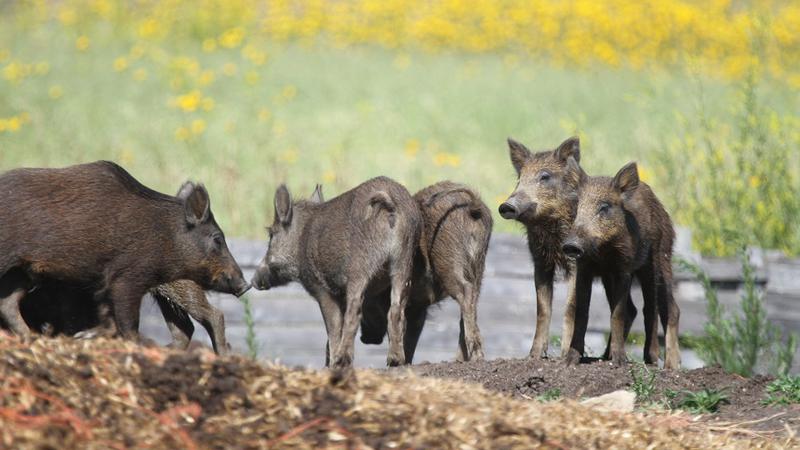
HOGS Gone Wild
Photo: Feral Pigs, Dr Ryan Brook
What are feral pigs?
Feral pigs are a combination of wild boars, escaped domestic pigs, and hybrid offspring of the two. The varied genetics of feral pigs gives rise to a wide range of appearances. They are light reddish brown to white to black in colouring and have coarse, dark hair on their bodies. Established populations of feral pigs are not present in BC, but are known in Alberta, Saskatchewan, and Manitoba.
Wildfires allowing for pigs to escape
The summer of 2023 saw many wildfires in the Shuswap region. These fires destroyed fencing and likely allowed for pigs to escape captivity. The number of pigs still in the wild following this outbreak is unknown, which raises concern for the possibility of feral pig populations beginning.
Impacts of Feral Pigs
Feral pigs threaten wildlife through predation and decrease biodiversity by outcompeting with native species. Disruptive rooting and wallowing behaviours increase erosion in aquatic environments. They cause major economic losses through crop and infrastructure damage, and transmit diseases to humans, livestock, and wildlife.
What can be done?
Report any sightings of wild pigs or pig activity such as tracks, wallows, and rubbing to the CSISS through the website, or with the Report Invasives mobile app. Do not hunt feral pigs, this causes them to spread out and form new groups that learn to avoid humans. Other management steps include more fencing, and vaccination of farm animals to prevent the spread of diseases from feral pigs. Never release captive pigs into the wild.
B.C Whirling Disease Update
Closures to prevent the spread
Whirling disease detections lead to the closure of all waterbodies in Kootenay and Yoho National Park until March 2025.
The first positive cases of whirling disease in British Columbia, were confirmed in Emerald Lake in late 2023, with additional detections in Kicking Horse River, Wapta Lake, Finn Creek, Monarch Creek and the confluence of Emerald River and Kicking Horse River.
This most recent announcement from Parks Canada will see all waterbodies in Kootenay and Yoho National Park closed until March 2025, in an effort to prevent the spread of this devastating disease.
To learn more about whirling disease and the impacts head to our website, here.
Captivating Content
Invasive species and nature inspired, news, stories, podcasts, and books capturing our attention.
Thompson Nicola Conservation Collaborative teams up with Kamloops Naturalist club and Dr. Tarasoff in wetland restoration project.
Thompson Nicola Conservation Collaborative has been working with the Kamloops Naturalists Club to use benthic barriers to suppress the growth of reed canary grass. There has been no re-growth after one year of treatment! This restoration project will hopefully allow for the re-growth of native plant species and enhance the wetland ecosystem. Check out the article below!
Here in the Columbia Shuswap, this past summer CSISS had the privilege to attend a benthic barrier workshop held by Dr. Catherine Tarasoff. As well, CSISS installed a benthic barrier with the Nature Trust BC along the SABNES trail, targeting a new site of Yellow Flag Iris along Shuswap Lake.
By the Moonlight – Bat Friendly Gardens!
We can’t wait for spring and all that it brings – including gardening! If you’re starting to think about getting your garden ready, try making it bat friendly and check out these helpful tips we learned from the Shuswap trails Alliance and Community Bat Programs of BC! Have you ever heard of moonlight gardening? Try planting night blooming flowers and your garden will come alive at night! These flowers attract moths that are an excellent food source for bats.
Learn more about bats in BC here
Upcoming Events
April 4 – Invasive Fish Webinar: Yellow Perch and Bass Fish, Andrew Klassen.
April 9 – CSISS 2024 AGM and Land Manager Meeting – register here!
April 11- Invasive Fish Webinar: Northern Pike, Evan Smith
April 13 – White Lake Turtle Festival
April 20 – Earth Day Event, Salmon Arm
April 24 – Earth Day Fair, Revelstoke
Contact CSISS to book a training presentation for your organization at: info@columbiashuswapinvasives.org
Thank You to our Funders in 2023-2024
We acknowledge the financial support of: the Province of British Columbia through the Ministry of Forests, BC Parks and the Community Gaming Grant; the Columbia Shuswap Regional District; The Forest Enhancement Society of BC, the Habitat Conservation Trust Foundation; The Nature Trust of BC; The City of Salmon Arm; Parks Canada; BC Hydro; the Shuswap Watershed Council; Environment and Climate Change Canada; Employment and Social Development Canada (Canada Summer Jobs); Eco Canada (Environmental Pathways and Science Horizons Wage Subsidies). We acknowledge the in kind support and partnership with several other organizations across the region.
Facebook icon
Twitter icon
LinkedIn icon
